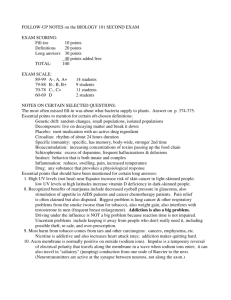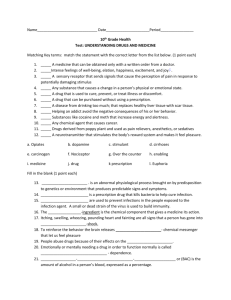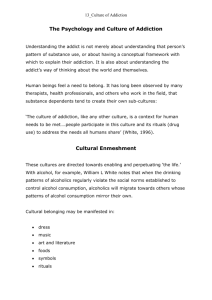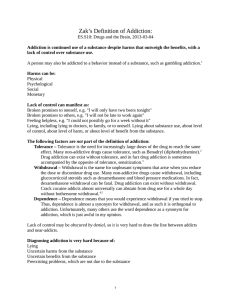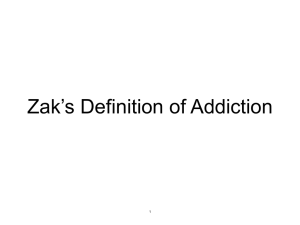Intro to Substance Abuse
advertisement
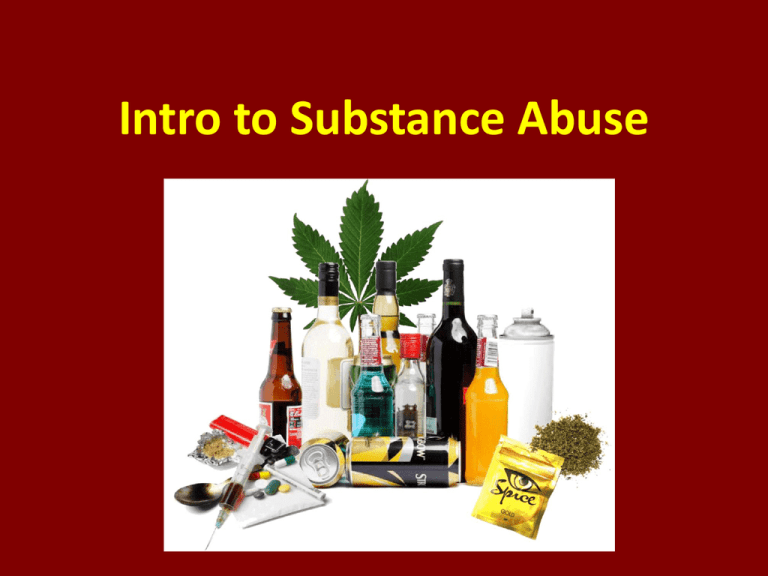
Intro to Substance Abuse Webquest Activity • Use the website to fill in the blanks for the following sections: -What are drugs? -Why can drugs be harmful to your health? -What are gateway drugs? • Find the same number laptop you had before to log on!! Warm Up • Read “The Brain-Body Connection” article in your packet • Answer the 3 questions at the bottom and be prepared to discuss in class! Types of Drugs • Prescription Drugs: need to be prescribed by a doctor • Over-the-Counter (OTC) Drugs: can be purchased at any time, at any store (with few exceptions, such as some cold medicines) • Recreational Drugs: used to “feel good” or “have fun”; alcohol, tobacco, caffeine • Illicit Drugs: illegal, most are psychoactive (change chemistry of brain) Categories of Drugs • Stimulants: accelerate the heart rate and elevate the blood pressure and "speed-up" or over-stimulate the body • Depressants: slow down the brain and the body • Opiates: cause drowsiness, confusion, nausea, feelings of euphoria, respiratory complications and relieve pain • Designer Drugs: created by changing properties of existing drugs; alters their effects • Inhalants: breathable substances that produce mind-altering results and effects • Steroids: taken to improve physical performance; lots of negative side effects • Hallucinogens: perceive things differently than they actually are Methods of Administration • Depending on how a drug is taken will determine the brain chemistry changes that occur when using the drug(s) Methods of Administration • Methods of taking drugs include: -Oral Ingestion: taken by mouth -Injection: (intramuscular or intravenous) syringe used to shoot drug directly into muscle or bloodstream -Smoke: like tobacco or marijuana -Inhalation: sniffing or breathing in the chemicals/drug -Absorption: drug is absorbed into bloodstream Affect of Drugs on the Brain • The quicker the drug reaches the brain, the more likely the user is to become addicted. • Drugs work in the brain by tapping into its communication system and interfering with the way nerve cells normally send, receive, and process information. The Brain and Drugs • Once a drug reaches the brain, it acts on one or more neurotransmitters, either increasing or decreasing their concentration and actions. The Brain and Drugs • Neurotransmitters include substances such as serotonin and dopamine that are released to make you feel good. The Brain and Drugs Warm Up • Complete the “How Much Do You Know About Drug Addiction?” questions in your unit packet Downward Spiral of Addiction • Experimentation: Use of a substance just to see what it is like; may be influenced by friends, family, or media • Recreation or Social Use: Use of a substance that makes user feel good; think they are having fun, fitting in with social norms; use becomes more frequent • Tolerance: The body needs more of the substance/drug because it requires more to get the same effect • Compulsive Craving: Beginning to have an uncontrollable need for the substance/drug • Addiction: Habitual (regular) and out of control use of drug or substance; user is dependent on substance/drug • Withdrawal: Changes that occur when substance/drug use stops Rate of Addiction • Genetics: connection to addiction via a family member or relative • Anxiety/Depression: causes someone to look for “relief”; stress, worry, tension • Drug/Substance: type being used; some can cause addiction even after just one use! • Addiction can affect someone physically, mentally, and socially. Lyric CornerThird Eye Blind-Semi Charmed Life • What do you think this song was about? • What were some lyrics that you saw that made this song relatable to addiction or substance abuse? Withdrawal • When someone tries to give up tobacco, alcohol, or other drugs/substances, they may suffer through a combination of symptoms: Common Withdrawal Symptoms Restlessness Depression Difficulty concentrating Eating more than usual Loss of Energy Tremors Impatience Stomach/Bowel Problems Heart Palpitations Frustration/Anger Headaches Sweating Drug Vocabulary • Dependence: when a user needs the drug/substance to function normally • Tolerance: when the person needs more and more of the drug/substance to get the same effect • Relapse: the tendency to return to addictive behavior after a period of abstinence • Euphoria: “high”; “feel good” sensation • Synesthesia: an effect where sensory messages are incorrectly assigned (hear a taste, smell a sound) • Flashbacks: perceptual distortions and bizarre thoughts that occur after the drug has been eliminated from the body Drug User Symptoms Personality •disrespectful •verbal/physical abuse •angry •confused •extreme mood swings •depressed •less out-going •secretive •lies about where they are going/who they are with steals •“loses” possessions (especially ones they used to value) •seems to have a lot of money or is always asking for money Physical Appearance •poor hygiene •not sleeping or sleeping too much •loss of appetite •weight loss or gain •too hyperactive or too little energy Social Activities/School Performance •drops old friends/activities •loss of interest in school work/poor grades •sleeps in class •loss of concentration •trouble remembering things

